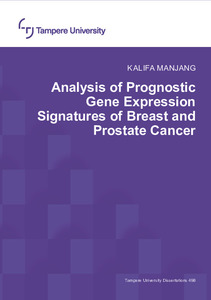Analysis of Prognostic Gene Expression Signatures of Breast and Prostate Cancer
Manjang, Kalifa (2021)
Manjang, Kalifa
Tampere University
2021
Tieto- ja sähkötekniikan tohtoriohjelma - Doctoral Programme in Computing and Electrical Engineering
Informaatioteknologian ja viestinnän tiedekunta - Faculty of Information Technology and Communication Sciences
This publication is copyrighted. You may download, display and print it for Your own personal use. Commercial use is prohibited.
Väitöspäivä
2021-11-19
Julkaisun pysyvä osoite on
https://urn.fi/URN:ISBN:978-952-03-2164-2
https://urn.fi/URN:ISBN:978-952-03-2164-2
Tiivistelmä
The advent of high-throughput sequencing and microarray technologies has improved our overall understanding of human health and diseases. Recent developments in ‘omics’ technologies (genomics, transcriptomics, proteomics, and metabolomics) have made it possible to measure tens of thousands of molecular quantities in parallel (in the same experiment). One specific objective of this thesis is to scrutinize a comparatively small subset of such measurements known as biomarkers or signatures relevant for predicting the course of a disease or patient’s outcome.
In the context of cancer, the discovery of prognostic biomarkers for predicting cancer progression is an important problem for two reasons. First, such biomarkers may be used to treat patients in a clinical setting. Second, it is thought that investigating the biomarkers themselves would yield novel insights into disease mechanisms and the underlying molecular processes that trigger pathological behavior. The latter assumption is investigated in detail in this dissertation. Specifically, we study this
problem for breast and prostate cancer by looking at a large number of previously reported prognostic signatures of breast and prostate cancer based on gene expression profiles. For this, we created a novel gene removal procedure (GRP) that purges all traces of biological meaning of the signatures genes and show that surrogate genes can be found among the remaining genes with better or equivalent prognostic prediction capabilities but distinct biological meaning as the published signature genes. As a result, our findings demonstrate that none of the examined signatures have a sensible biological meaning in terms of disease etiology and are merely black-box models allowing to make predictions of patient outcome but are not capable of offering causal explanations to improve disease understanding.
In the context of cancer, the discovery of prognostic biomarkers for predicting cancer progression is an important problem for two reasons. First, such biomarkers may be used to treat patients in a clinical setting. Second, it is thought that investigating the biomarkers themselves would yield novel insights into disease mechanisms and the underlying molecular processes that trigger pathological behavior. The latter assumption is investigated in detail in this dissertation. Specifically, we study this
problem for breast and prostate cancer by looking at a large number of previously reported prognostic signatures of breast and prostate cancer based on gene expression profiles. For this, we created a novel gene removal procedure (GRP) that purges all traces of biological meaning of the signatures genes and show that surrogate genes can be found among the remaining genes with better or equivalent prognostic prediction capabilities but distinct biological meaning as the published signature genes. As a result, our findings demonstrate that none of the examined signatures have a sensible biological meaning in terms of disease etiology and are merely black-box models allowing to make predictions of patient outcome but are not capable of offering causal explanations to improve disease understanding.
Kokoelmat
- Väitöskirjat [4773]
